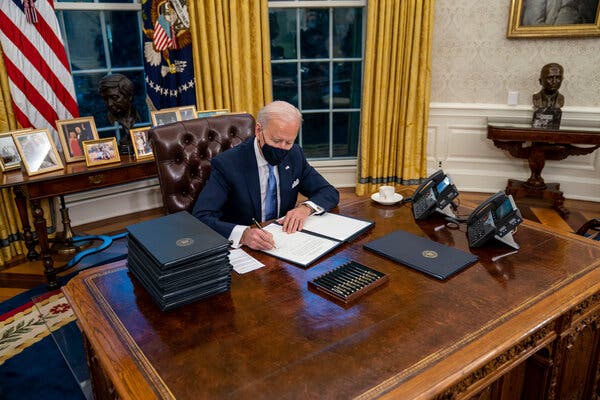The first telephone call between US President Joe Biden and Russian President Putin proves the Kremlin’s intention to continue implementing a confrontational policy in the relations with the West, and the reset futility because of the Russian government’s failure to take responsibility and abandon aggressive actions against Washington and its allies.
The way the Kremlin and the White House interpreted the phone call content has differed greatly. Moscow presented the conversation in its own vision of reality by ignoring some of Biden’s theses. The content of press releases published by Washington and Moscow coincides only by 20%.
Russia has completely ignored Biden’s condemnation of Russian opposition leader Alexei Navalny’s arrest, hacker attacks on SolarWinds and the bounties granted by Russia to the Taliban in Afghanistan for attacking coalition forces.
The only issue that the Kremlin interpreted in the same way as the White House was the START-3 nuclear treaty extension for five years, until February 5, 2026.
The October 1, analysis of the treaty extension prospects informed that Russia has every reason to want to keep the status quo under New START, which guarantees strategic nuclear parity with the US.
The economic crisis against the pandemic, accompanied by the bankruptcy of some Russian regions and imposed sanctions, limits the Russian defense complex and its ability to field new types of weapons and maintain a nuclear arsenal. This is the reason for Putin’s incredible swift reaction to introduce the START-3 extension draft into parliament and its fast adoption. The White House seems to be careful to separate the issue of New START – as well as plans to “explore” discussions on broader arms-control and security issues – from the context of bilateral relations as a whole and from any specific aspects of those ties.
However, the treaty extension issue plays a significant role for the Kremlin’s information policy and state propaganda.
The Kremlin is fearful of increasing political and economic pressure amid massive protests in the country and heightened tensions in Putin’s environment. After the telephone conversation Russian state media covered the treaty extension as Moscow’s victory and weak position of Joe Biden. The latter, in the Kremlin’s interpretation, made concessions to the Russians, although initially the START-3 treaty extension was on the Biden Administration agenda. The extension of New START does not mean there’s a sea change in our outlook on Russia, which is colored by concerns about Moscow’s conduct and intentions in an array of areas, from human rights and freedoms at home to various forms of interference abroad.
It signals that the United States – while pursuing agreements it deems to serve its security interests, such as the New START extension – will not sacrifice one interest in pursuit of another.
The White House devoted a separate sentence to Ukraine, and mentioned it before turning to other concerns. The White House press release says that Joe Biden has reaffirmed the United States’ support for Ukraine’s sovereignty. In its turn, Moscow stated that the parties had discussed an ‘Ukrainian deconflict’ by sharing the Kremlin’s traditional denial of its involvement in arming, sponsoring and controlling armed groups in Donbass, and ignoring the Crimean Peninsula annexation in 2014.
Previously, Biden has pledged to increase US support for the country, including the supply of lethal weapons, while also calling on Russia to end its “aggression” and “occupation” of Ukraine.
The Kremlin noted that during the conversation the parties had discussed the problem of the coronavirus fight and trade and economic cooperation. However, the White House press release says nothing about these very topics. Two more issues that one cannot find in the Biden Administration release are the US withdrawal from the Open Skies Treaty and the Iranian nuclear agreement. Obviously, on one hand, Moscow tries to overestimate the level of the agenda in bilateral relations, however, on the other hand, the Kremlins intends to neutralize the second party’s accusations by trying to present the US actions as unconstructive on a number of issues, and to focus on the problems the Biden administration has inherited from its predecessor. In addition, the Kremlin tries to depict the United States and Russia as equals sharing a place at the top.
The big differences in interpretations of the telephone conversation between Biden and Putin indicate that Russia cannot join a civilized negotiation process since the Kremlin is unable to accept criticism and admit its responsibility despite indisputable evidence. Moscow continues following deception and denial policy that makes it incapable of negotiating. We cannot engage in dialogue with a regime that does not accept arguments and ignores facts.
POTUS’ intention was also to make clear that the United States will act firmly in defense of our national interests in response to malign actions by Russia. Biden told Putin in the phone call, that the U.S. would defend itself and take action, which could include further sanctions, to ensure Moscow does not act with impunity.
After Donald Trump’s restraint regarding Russia’s destructive policy and subversive operations against the United States, Biden will confront Putin on the real issues at hand.
During the election campaign, Biden described Russia as the “biggest threat” to US security and alliances. He promised to convene a summit of democracies to join forces against the rise in authoritarianism around the world.
Biden-Putin phone call indicates a new era in US-Russia relations, one in which the president of the United States will actually stand up for his country and its values against the Russian strongman.

Biden believes that Russia intends to weaken Western countries from within, undermine the unity of NATO, the EU and the existing global order. He thinks that Russia is an aggressive revanchist force trying to resist the United States in the same way as the USSR.
Thus, it is extremely important for the new White House Administration to restore the integrity and unity of NATO as a collective equipoise to the chaos policy that Moscow is imposing on Europe.




